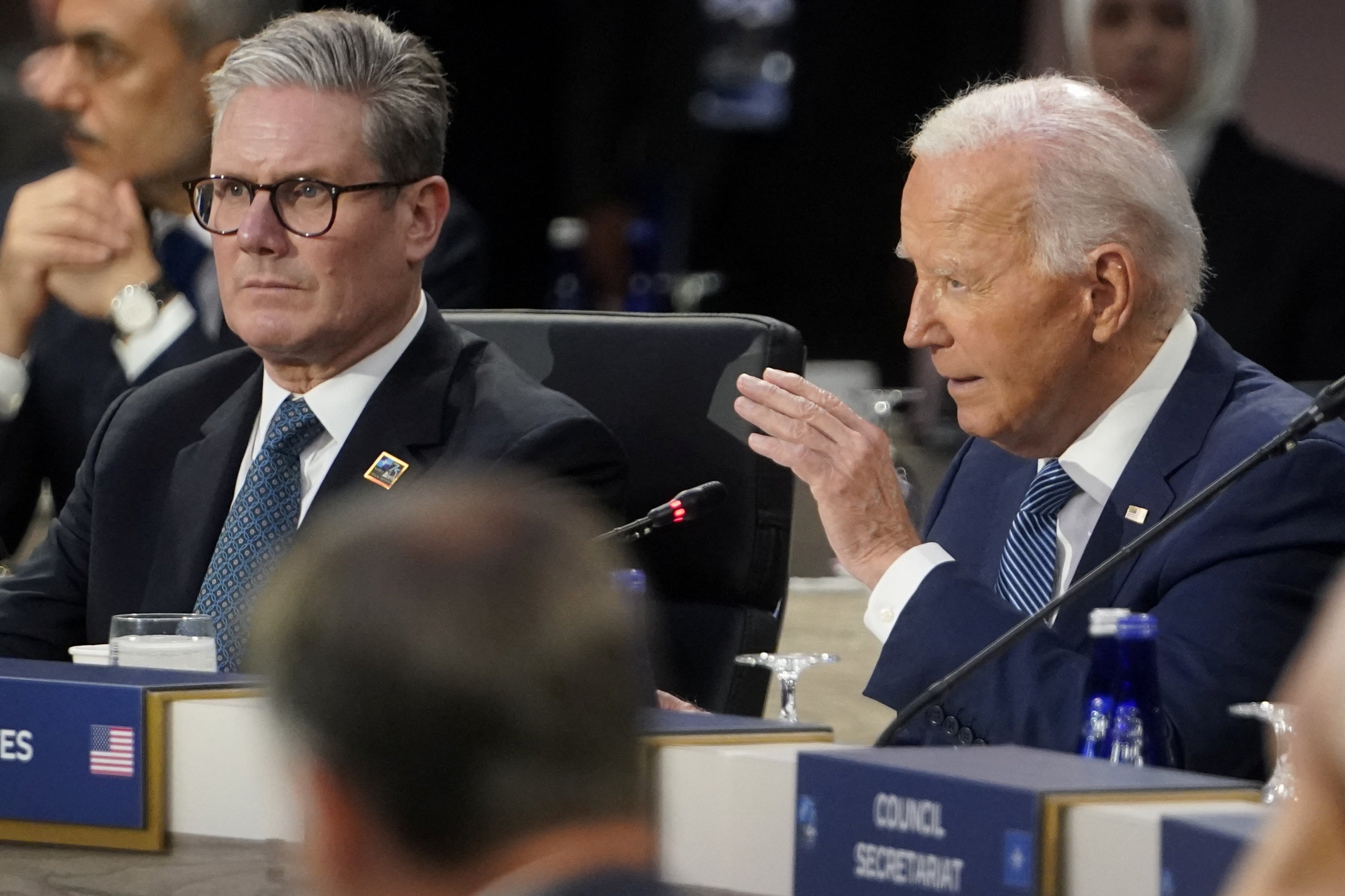Labour aims to make Britain the leading European nation in Nato – but will Trump care?
Keir Starmer’s pledge on defence spending has struck the right note with Nato but the shadow of Donald Trump looms large over the summit, says Kim Sengupta


Sunak pledge now comes with the Starmer guarantee of delivery” is how new defence secretary John Healey describes the key deal at this summit, painting Britain as the leading European nation in Nato as questions are raised about future US support for the alliance.
Donald Trump’s brooding presence looms over Nato’s 75th anniversary meeting in Washington, with his possible return to the White House pointing to probabilities ranging from negotiating a peace deal with Vladimir Putin to renewed demands that other member states cough up more money for defence.
Steven Cheung, the Trump campaign’s communications director, stressed to visiting leaders that the former president has “repeatedly stated that a top priority in his second term will be to quickly negotiate an end to the Russia-Ukraine war”. Trump believes that European nations “should be paying more of the cost of the conflict, as the US has paid significantly more, which is not fair to our taxpayers”, Cheung said.
Healey acknowledges Trump’s tough stance, but points out that, whoever is elected to the White House, Britain must “recognise that the American priorities are likely to shift increasingly to the Indo-Pacific and to other parts of the globe”.
“The consequences of that are that European nations in Nato must do more of the heavy lifting and [provide] some of the leadership that traditionally we’ve been able to look to the Americans to do,” he says. “Under the new government, Britain will be the leading European nation in Nato. We recognise the responsibilities that, with other European nations, we must pick up [in order to] help secure Nato.”
But the huge sums of money Nato needs to function suggest that it will still be heavily dependent on the United States if it is to continue as a viable military alliance.
Healey and foreign secretary David Lammy have said they will be urging other member countries to increase their defence spending to 2.5 per cent of GDP. But Britain itself is at present spending only 2 per cent – the minimum Nato recommendation. Starmer’s government has a “total commitment to raising UK defence spending to 2.5 per cent”, they say, but only when the economy allows it.
It is true, as Healey points out, that the last time Britain spent 2.5 per cent was under Labour in 2010. But there have since been repeated cuts, while other Nato states, such as Poland, have made substantial increases. Germany’s 2024 defence budget is now bigger than Britain’s for the first time since the Second World War, at £77.5bn compared with £63.9bn.
The US spends £670.15bn on defence – 3.49 per cent of its GDP, and twice as much as the £314.5bn spent by the European states and Canada. Trump says he will end that discrepancy.
The Biden administration claims that, despite Trump’s bellicose demands for more defence funding, the former president produced little in the way of concrete results while he was in the White House.
“When President [Joe] Biden took office in 2021, our alliances around the world were atrophied and underutilised,” says national security adviser Jake Sullivan. “Now, three and a half years later, our allies are committing more to our common defence than at any point since the end of the Cold War.”
He adds: “Let’s start with the numbers. We are closer than ever to fulfilling the pledge that alliance members made 10 years ago, after Russia’s illegitimate annexation of Crimea, to spend 2 per cent of their gross domestic product on defence. Now, 23 Nato members out of 32 are expected to meet or exceed that target in 2024, compared with just nine in 2020 and five in 2016.”
The Biden administration, Sullivan continues, has helped “democratic allies globally” to seek common purpose. “Our Indo-Pacific allies have come to Ukraine’s aid, while our European allies are taking a more active role in the Indo-Pacific region. Britain is helping Australia build nuclear-powered submarines. European and Indo-Pacific allies are cooperating closely with the United States to protect sensitive technologies critical to national security from being used by China against us.”
Yet India – the world’s largest democracy, which successive US administrations have assiduously courted as a bulwark against China – has continued trading in Russian oil during the Ukraine war. Prime minister Narendra Modi this week gave his trademark bear hug to Vladimir Putin in Moscow. And Saudi Arabia has warned that it could sell off European debt holdings if the West continues with moves to seize almost $300bn (£234bn) in frozen Russian assets.
In reality, despite Nato’s best efforts, the Ukraine war has had little traction in much of the global South. For countries much closer to Russia, what is happening in Ukraine is an existential threat, and the Washington summit comes at a vital time. Sweden applied to join the alliance in May 2022 after Putin’s invasion, becoming a member in March this year. Its foreign minister Tobias Billstrom says that, for Sweden, being in the alliance is “like coming home”.
Latvian foreign minister Baiba Braze says: “The policy of Russia is war. It’s not going to go away just in a few years. We need Nato, and we need the US to be with us in what we face.”






Join our commenting forum
Join thought-provoking conversations, follow other Independent readers and see their replies
Comments